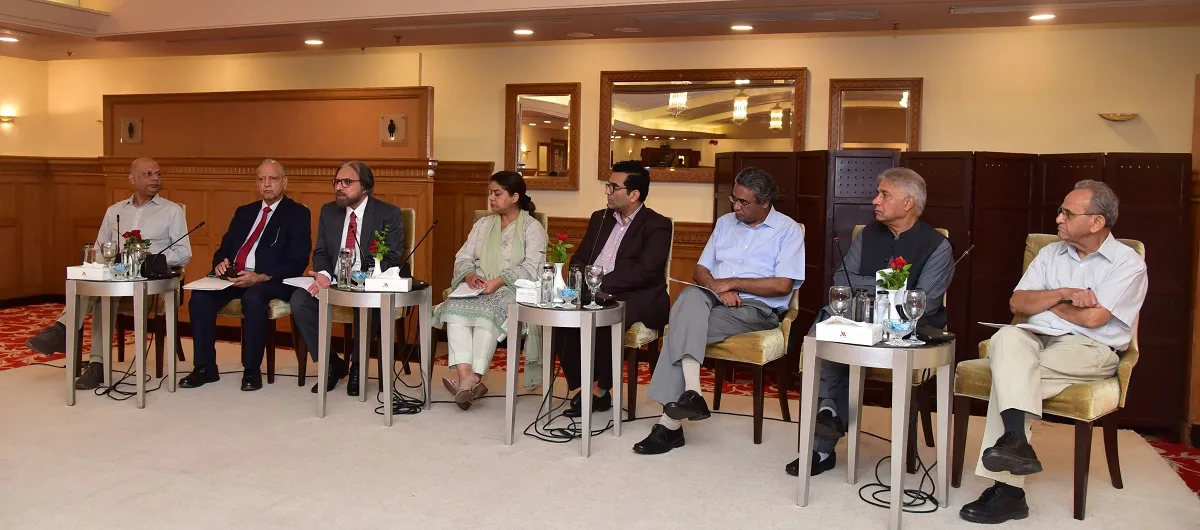ISLAMABAD, Pakistan: The Islamabad: Centre for Social Justice (CSJ) in collaboration with Idara-e-Taleem-o-Aagahi (ITA) and Human Rights Commission of Pakistan (HRCP) organized a conference on Mapping the Educational Reforms in View of the Next Democratic Tenure, wherein independent education policy experts, government stakeholders, and political parties agreed on introducing reforms for more inclusive and equitable quality education.
Speaking on the occasion, Dr. Baela Raza Jamil, CEO Idara-e-Taleem-o-Aagahi said that education with learning is a lifeline for all citizens without discrimination. Pakistan remains lowest on key indicators of SDG 4 in South Asia failing to live up to Article 25-A, a fundamental constitutional right to education. In Spite of progressive manifestos, political parties repeatedly fall short of delivering what they promised, compromising, excluding, and crippling the lives of millions of children, especially girls and marginalized groups. May the coming elections be a new beginning for progressive education investment and delivery for all citizens protected with strong learning foundations.
Dr. A. H. Nayyar said that the state has failed to implement the Article 25-A and provide free and compulsory education to all children under 16 years as nearly half the children are deprived of schooling on account of the failure of the state to provide the resources needed for the task. The political parties must promise in their election manifestos to enhance allocation to education by 6% of GDP.
Dr. Shoaib Suddle said that the government has been violating order no. 2 of the Jillani judgment (SMC 1 of 2014, etc.) and Article 22(1) of the constitution because school curriculum and textbooks of compulsory subjects like Urdu, English and Social Studies carry substantial content relating to the religious instruction of majority religion, compelling non-Muslim students to learn Islamiyat in all courses.
Peter Jacob, Executive Director, Centre for Social Justice said that fulfilling and implementing Articles 22 (1) and 25-A of the Constitution of Pakistan on the right to education without discrimination, is a fundamental constitutional obligation and a pressing need for improving foundational literacy, and the quality of education. He added that civil society will continue to engage effectively with political parties for positive educational reforms before and after the elections in 2023.
Wajahat Masood appreciated the landmark decision of the supreme court issued on 19 June 2014. He added that it is not possible to implement articles 20, 22 (1), and 25-A of the constitution in letter and spirit unless related laws and policies are made likewise, as they are sectarian, religion-based, and discriminatory. He added the state of Pakistan needs to ensure the equality of citizens and discourage appeasing groups promoting division on the basis of identity.
Dr. Prof. Yaqoob Khan Bangash said that there has to be social interaction among students from majority and minority communities inside and outside classrooms to promote inclusion, pluralism, and diversity.
Waseem Ajmal, Federal Secretary, Ministry of Federal Education & Professional Training assured that the ministry is committed to removing religious instruction and hate speech present in compulsory subjects to implement Article 22(1) of the Constitution.
Saima Anwer said that school curricula and textbooks should focus on promoting inclusion, diversity, critical thinking, and learning outcomes. Moreover, minorities should have access to suitable alternatives to compulsory Islamic education.
Farhatullah Babar, former Senator from PPP said that quality education should be a priority of the political parties to inculcate pluralistic values in children, and measures to transform schools into religious seminaries with single national curriculum and induction of madrassa graduates as teachers must be revisited.
Sana Jamali, Senator, and convener of the Education Parliamentary caucus said that civil society, government and politicians need to work together and take meaningful actions to educate all children who are out of school and drop-outs.
Zubaida Jalal, MNA said that our primary aim in pursuit of educational reforms should be to cultivate equitable learning environments, where every student can access quality education and excel. Public education must be centered on creating inclusive spaces that empower students to become valuable and participative members of society. By building on these principles, we should strive to drive meaningful changes and advancements in our education system.
Mehnaz Akber Aziz, MNA emphasized bringing out-of-school children into schools, quality education, and learning outcomes. She supported the cross-party caucus on inclusive education, and proposed to initiate a scorecard of every legislator regarding their education-related interventions in their constituencies.
Dr. Ammar Ali Jan, President of the Haqooq-e-Khalq Party said that there is a need to allow critical thinking on campuses. It will only be possible if we stop viewing education from a security lens and start treating universities as sites for dialogue and debate. Moreover, we must plan our economy to ensure a university-jobs pipeline. It is unacceptable that so many bright young people with degrees are jobless. We must ensure that there are adequate jobs available for students graduating from universities.
Dr. Baela Raza Jamil, Dr. A. H. Nayyar, Peter Jacob, Wajahat Masood, Dr. Yaqoob Khan Bangash, Saima Anwer, Waseem Ajmal, and Dr. Shoaib Suddle were among the panelists. Whereas, the politicians including Farhatullah Babar (PPP), MNA Mehnaz Akber Aziz (PML-N), MNA Zobaida Jalal (MNA), Senator Sana Jamali, and Ammar Ali Jan (HKP) presented their parties’ perspectives on the educational reforms. Faaria Khan hosted the conference, while Harris Khalique and Munizae Jahangir moderated the panel discussions on different topics focused on inclusive and equitable quality education and political parties’ commitment and actions for educational reforms.




